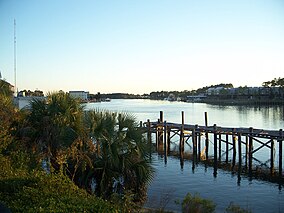| Tate's Hell State Forest | |
|---|---|
 | |
| Location | Franklin and Liberty counties, Florida |
| Nearest city | Carrabelle, Florida |
| Coordinates | 29°55′13.52″N 84°49′29.11″W / 29.9204222°N 84.8247528°W |
| Area | 202,000 acres (82,000 ha) |
| Created | 1994 |
Tate's Hell State Forest is 202,000 acres (819 km2) of land in Franklin and Liberty counties in Florida. The forest is located near Carrabelle off US 98 along the Gulf coast and on St. James Island. At one time, Tate's Hell supported at least 12 major habitats including: wet flatwoods, wet prairie, seepage slope, baygall, floodplain forest, floodplain swamp, basin swamp, upland hardwood forest, sandhill, pine ridges, dense titi swamp thickets and scrub. Tate's Hell State Forest is an important hydrologic area and includes a section of the New River (Florida Panhandle). The park's watershed provides fresh water into the Apalachicola Bay, the Carrabelle River and the Ochlockonee River.
During a 40-year period of private ownership prior to the state's acquisition in 1994, over 800 miles (1,300 km) of forest roads and ditches were constructed on the property to accommodate intensive commercial forest management operations. Most of the area was planted with pine monoculture and the drainage canals dried what had been previously wetlands. There was extensive loss of habitat and wildlife. Apalachicola Bay suffered from the loss of the previously continuous fresh water flow into the bay provided by the wetlands, adding to the effect of loss of water flow into the bay from the Apalachicola River. Causes include surface water use upstream of the Apalachicola River basin, such as supplying drinking water to the city of Atlanta, and agriculture use in Georgia. Debate over the use of water in this basin is the subject of a long-standing feud among the three southern states over which use or which user takes precedence over the others. A recent court ruling[1] sets forth the history of water use in the upper reaches of the basin.